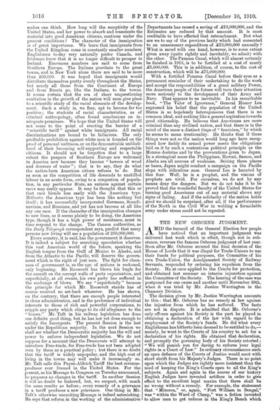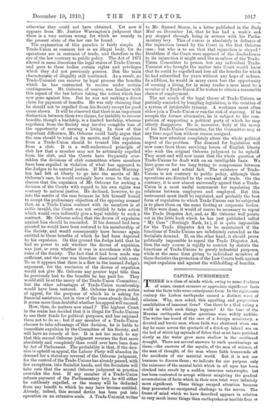THE NEW OSBORNE JUDGMENT.
j_LMID the turmoil of the General Election few people have noticed that an important judgment was delivered last week which in effect, though not in sub- stance, reverses the famous Osborne judgment of last year. Soon after Mr. Osborne secured the final decision of the House of Lords that it was illegal for Trade-Unions to use their funds for political purposes, the Committee of his own Trade-Union, the Amalgamated Society of Railway Servants, responded by ordering his expulsion from the Society. He at once applied to the Courts for protection, and obtained last summer an interim injunction against the Committee of the Society. The hearing of the case was postponed. for one cause and another until November 30th, when it was tried by Mr. Justice Warrington in the Chancery Division.
The decision given by Mr. Justice Warrington amounts to this : that Mr. Osborne has no remedy at law against the injustice from which he has suffered. The facts are not in dispute. It is admitted that Mr. Osborne's only offence against his Society is the part he played in obtaining a declaration of the law with regard to the employment of the Society's funds. He did what every Englishman has hitherto been deemed to be entitled to do,— namely, he went to the Courts of his country to ask for a declaration of his rights. He obtained that declaration, and promptly the governing body of his Society retorted : " We will punish you for daring to enforce your legal rights in a Court of Law." In ordinary circumstances such an open defiance of the Courts of Justice would. meet with short shrift from his Majesty's Judges. There is no point upon which the Judges are rightly more insistent than the need of keeping the King's Courts open to all the King's subjects. Again and again in the course of our history English Judges have invented artifices in order to give effect to the excellent legal maxim that there shall be no wrong without a remedy. For example, the statement that " Minorca," or, again, " Fort William in Bengal," was " within the Ward of Cheap," was a fiction invented to allow men to get redress in the King's Bench which otherwise they could not have obtained. Yet now it appears from Mr. Justice Warrington's judgment that there is a very serious wrong for which no remedy in the present state of the law can be found. The explanation of this paradox is fairly simple. Trade-Union at common law is an illegal body, for its operations are in restraint of trade, and therefore in the eye of the law contrary to public policy. The Act of 1871 altered in some directions the legal status of Trade-Unions, and gave to these bodies certain rights and privileges which they did not previously possess. But the main characteristic of illegality still continued. As a, result, no Trade-Unionist can recover by legal process the benefits which he has contracted to receive under certain contingencies. Mr. Osborne, of course, was familiar with this aspect of the law before taking the action which has now gone against him. But he was not making a direct claim for payment of benefits. He was only claiming that he should not be expelled from his Society except for good cause shown. It will be observed that there is an important distinction between these two claims, for inability to recover benefits, though a hardship, is a, limited hardship, whereas expulsion from the Society may involve complete loss of the opportunity of earning a living. In view of this important difference, Mr. Osborne could fairly argue that the case should be tried on its merits, and that expulsion from a Trade-Union should be treated like expulsion from a club. It is a well-understood principle of club law that a member may not be arbitrarily expelled front his club, and the Courts have frequently over- ridden the decisions of club committees where members have been expelled in violation of what has appeared to the Judges to be natural justice. If Mr. Justice Warring- ton had felt at liberty to go into the merits of Mr. Osborne's case, he would certainly have come to the con- clusion that the expulsion of Mr. Osborne for seeking a decision of the Courts with regard to his own rights was contrary to natural justice. He declined, however, to go into the merits of the case because he felt himself bound to accept the preliminary objection of the opposing counsel that, as a Trade-Union contract with its members is ab initio invalid, the Court was not entitled to take action which would even indirectly give a legal validity to such a contract. Mr. Osborne asked that the decree of expulsion against him should be rescinded. If his demand had been granted he would have been restored to his membership of the Society, and would consequently have become again entitled to those benefits of which he had been deprived by his expulsion. On this ground the Judge held that he had no power to ask whether the decree of expulsion was just, or even whether it was in accordance with the rules of the Society. The fact that it had been made was sufficient, and the case was therefore dismissed with costs. To us it appears that there is a flaw in the learned Judge's argument, for the rescission of the decree of expulsion would not give Mr. Osborne any greater legal title than he previously had to the benefits he has paid for. They would still be at the mercy of the Trade-Union Committee ; but the other advantages of Trade-Union membership would have been restored. Mr. Osborne has given notice of appeal, for the purposes of which he is asking for financial assistance, but in view of the cases already decided, it seems more than doubtful whether his appeal will succeed. How, then, do matters now stand ? The highest Court in the realm has decided that it is illegal for Trade-Unions to use their funds for political purposes, and has enjoined them not to do so ; but if any member of a Trade-Union chooses to take advantage of this decision, he is liable to immediate expulsion by the Committee of his Society, and will have no remedy at law. It is not too much to say that this second Osborne judgment reverses the first more absolutely and completely than could ever have been done by Act of Parliament. The probability is that, if the deci- sion is upheld on appeal, the Labour Party will abandon its demand for a statutory reversal of the Osborne judgment, for the control of the Trade-Unions has already passed, with few exceptions, into Socialist hands, and the Socialists will take care that the second Osborne judgment in practice overrides the first. If any member of a Trade-Union refuses payment of the Parliamentary levy, he will either be ruthlessly expelled, or the money will be deducted from any benefit to which he may have become entitled. Already, indeed, this second device has been put into operation on an extensive scale. A Trade-Unionist writes to Mr. Samuel Storey, in a letter published in the Dais Mail on December 1st, that he has had a week's sick pay stopped through being in arrears with his Parlia- mentary levy. This of course is absolutely in defiance of the injunction issued by the Court in the first Osborne case ; but who is to see that that injunction is obeyed ? Doubtless if the Court were apprised of the disobedience to its injunction it might send the members of the Trade- Union Committee to prison, but any individual Trade- Unionist who brought the matter into Court would know that he could be expelled and lose all the benefits for which he had subscribed for years without any hope of redress. In addition, he would in many cases lose the opportunity of earning a living, for in many trades a man must be a member of a Trade-Union if he wishes to obtain a reasonable chance of employment.
The net result of the legal theory of Trade-Unions, as partially amended by bungling legislation, is the creation of a system of intolerable tyranny. A workman must often either join a Trade-Union or run the risk of starving. If he accepts the former alternative, he is subject to the com- pulsion of supporting a political party of which ho may utterly disapprove. He is, moreover, daily at the mercy of his Trade-Union Committee, for the Committee may at any time expel him without reason assigned.
This new situation completely alters the whole political aspect of the problem. The demand for legislation will now come from those surviving lovers of English liberty who wish the original Osborne judgment to be uphold. They must and will now insist that the whole question of Trade-Unions be dealt with on an intelligible basis. We have gone on for too long trying to compromise between legal theory and actual fact. The existence of Trade- Unions is not contrary to public policy, although their operations are directed to the restraint of trade. On the contrary, it is now almost universally agreed that a Trade- Union is a most useful instrument for regulating the relations between employers and employed. But this instrument must itself be regulated, and probably the best form of regulation to which Trade-Unions can be subjected is to place them on the same footing as corporate bodies. If this were done, it would of course be necessary to repeal the Trade Disputes Act, and, as Mr. Osborne well points out in the little book which he has just published called " My Case" (Eveleigh Nash, ls.), it is quite impossible for the Trade Disputes Act to be maintained if the functions of Trade-Unions are indefinitely extended as the Socialists demand. If, on the other hand, it should prove politically impossible to repeal the Trade Disputes Act, then the only course is rigidly to restrict by statute the functions of Trade-Unions to purely industrial purposes, while at the same time giving to individual members of these Societies the protection of the Law Courts both against unjust expulsion and against the withholding of benefits.



























































 Previous page
Previous page